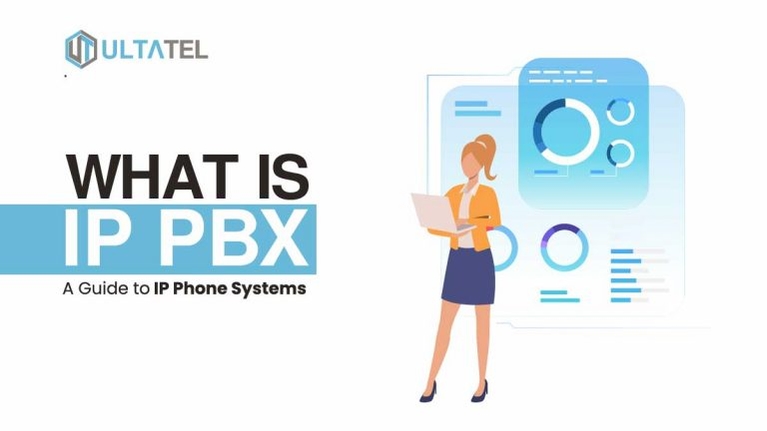Business owners nowadays look for new phone communication services to keep up with the constantly changing business world. They also consider how those new services can be cost-effective, problem free, and with as much flexibility as possible. If you are also considering this, then IP PBX is your best option. IP PBX is an internet-based alternative to the traditional phone call systems businesses have long used. In this article, you will learn more about how IP PBX works, its types, and its limitations to make sure you choose the best option for your business.
What is IP PBX?
IP PBX or Internet Protocol Private Branch Exchange is a modern telecommunication system that depends on the internet to make and start and receive internal phone calls within businesses. It enables users to switch from an IP-based phone network to a traditional PTSN (Public Switched Telephone Network) system.
How IP PBX Systems Work
IP PBX depends on the internet to make and receive phone calls. This happens by converting analog voice signals into data, transmitting them over the internet, and converting them into voice signals to the receiver on the other end. This is just a gist, but if you are interested to learn more about the process of how IP PBX works, you can read more about it.

Key Features of IP PBX Systems
After learning some information about what IP PBX is and how it works, it’s time to learn about some features that make it stand out as a modern communication system.
- VoIP Ready: IP PBX or VoIP PBX represents an up-to-date version of the traditional PBX and PSTN phone services. This is very important in a constantly changing and developing business world, as statistics show that more than 40% of businesses in the UK alone prefer internet-based phone services over traditional landline ones.
- Voice Messaging: IP PBX provides the additional feature of sending voicemail messages. You can send messages as an attachment to an email in the form of an MP3 file or a transcription.
- Conferencing: In the last couple of years, conferencing has become essential for businesses, so it is crucial for business owners nowadays to opt for telecommunication systems that support this option. IP PBX does not only support the option of three-way conference calls, but you can add multiple participants to your conference calls.
- Remote Working Capabilities: Remote working and working from home has become an option that many businesses turn to, so ensuring that your phone system can support this option is worthwhile. IP PBX has features such as ‘Find Me,’ ‘Follow Me,’ and remote IP extensions, which make voice connectivity easy for businesses that support working remotely.
- Detailed Reporting: This feature gives you the history of the phone calls in the form of a graph. It also can filter your phone calls by user, duration, and date. This is an essential feature as businesses often need a reporting feature to be built into their phone system.
Benefits of IP PBX Systems
- Cost-effective: IP PBX systems save your business a significant amount of money. If your business requires international phone calls, you can use a VoIP provider to make this happen, which would be much cheaper than traditional landline phone calls. Similarly, if your business has multiple branches, you can connect the systems and make phone calls for free!
- Easy to manage and maintain: Making changes, adjustments, or updates while using traditional phone systems is expensive and time-consuming. On the contrary, you don’t need an expensive IT expert to make adjustments or additions while using IP PBX systems because anything can be done virtually and quickly.
- Includes advanced features: IP PBX systems mainly depend on software, which makes it possible to include many useful and cool features. Such features include conference calls, Chat, and CRM. Such functions are difficult to integrate if you use traditional PBX systems that depend on hardware.
- Ensures better mobility: Choosing IP PBX systems allows more mobility within your business. With the options of softphones and applications for mobile phone devices, your employees can make phone calls with colleagues or customers from anywhere they want.
- Keeps existing hardware: Using IP PBX will still allow you to keep your existing hardware attached to your PBX without spending any extra money. You will need a SIP address, password, and domain, and then you will be ready to use IP PBX.
Types of IP PBX Systems
If you are considering changing from a legacy system, choosing the best IP PBX solution for your business is very challenging. Therefore, this part presents two of the most commonly used types of IP PBX so you can make sure you’re opting for the most suitable option.
On-premises IP PBX
Known as a VoIP PBX, on-premises PBX uses the internet connections you already have in your office, so you will not have to spend money on that area. It offers more features and services than the traditional legacy PBX. Some features include voicemail to email, conferencing, fixed\mobile coverage, and much more. On-premises PBX provides a more stable and robust sound quality than a legend system, especially when combined with SIP trunk.
Cloud PBX
A cloud PBX is also known as a hosted PBX or virtual PBX. This system works off-site in the cloud and is managed and maintained by a VoIP provider. This is a brilliant option for small businesses, as off-site providers cost low costs. Even bigger business owners who can afford an on-premises IP PBX now turn
to cloud PBX because it is cost-effective. Also, hosted PBX provides you with constant software updates so that you will benefit from the latest features. So, this is an innovative and flexible option that also saves your business money!
Limitations of IP PBX Systems
Although IP PBX systems are very efficient, they don’t suit some businesses. So, here are some of their limitations to consider:
- Requires skilled workers: Managing an on-premises PBX isn’t for the faint of heart. Systems administrators should be comfortable installing and configuring Linux operating systems. Experience with FreePBX or Asterisk open-source software is a must.
- Limits working remotely: Working remotely is difficult while depending on an on-premises PBX, even with IP connectivity. However, this problem can be easily solved by downloading an app and signing in to the system.
- Limited Scalability: IP PBX services guarantee scalability if your business has enough employees to take phone calls. If your team expands beyond the capabilities of PBX, you will face problems like getting busy signals.
FAQs
This article covered many points you need to know if you are considering upgrading the phone call systems of your business. However, if you still have questions, this section will answer some frequently asked questions about IP PBX systems.
What’s the difference between PBX and IP PBX?
IP PBX is the modern version of the traditional PBX. IP PBX uses the internet to make phone calls between members of the same business happen, while PBX is the traditional phone system that uses a landline.
What type of companies use IP PBX?
IP PBX allows phone connectivity within the same business building. This system can be used for any type of company regardless of its size or the service or products it presents. IP PBX is efficient for on-
premises or remote working, so it can be used for companies that work remotely or with a hybrid system of both. In a nutshell, it fits all companies as it is a flexible and cost-efficient system.
How much does IP PBX cost?
IP PBX’s cost differs based on the number of employees and the number of lines you need within your business office. Numerous pricing plans suit different businesses with their various needs. The minimum price, however, starts at 15.95$ per month\user.
What is Asterisk PBX?
Asterisk is the software that makes IP PBX systems function. It gives call control services to registered phone call destinations and manages some VoIP protocols, such as SIP, H. 323, and MGCP.
Summary
To summarize all the points mentioned above, IP PBX is a modern and up-to-date phone system worth investment. It is flexible, saves money for your business, and spares you the time wasted in a long period of maintenance of traditional phone systems. It is also a brilliant solution that fits the needs of our modern business world because it can be used for working on-site or remotely if needed.

